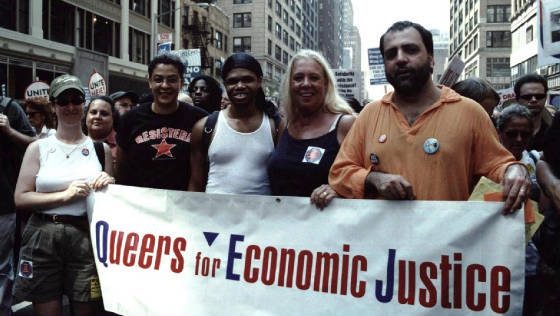Queers for Economic Justice has been left in the financial lurch, needs your support.
Having taken the reigns as the Executive Director of Queers for Economic Justice (QEJ) just four months ago, Kenyon Farrow wrote an emergency call for donations this week with a sense of trepidation. The organization working to challenge conditions that create poverty in the LGBT community was, quite literally, reflecting the needs of its population, and Farrow was feeling the weight of responsibility. “As a new Executive Director, it’s hard not to feel somewhat liable, or even guilty, about our position,” he says. This self-effacing perspective is laudable yet undeserved, as the organization’s dilemma could not have been predicted.
In August 2009 QEJ was awarded a $40,000 grant from the New York State Senate, but legislative squabbles in the capital froze governmental expenditures deemed uncritical, and the delay has the nonprofit still waiting to receive its promised funds. While a larger organization may have the financial reserves to weather this type of bureaucratic storm, those that work at the grassroots level have to rely on their community’s support and understanding in a time of economic crisis.
As unemployment and the need for public assistance rise, the reality has set in that economic issues are queer issues, too—particularly for women and people of color who face double discrimination. At this point, Farrow anticipates the Senate funding will not come through until April, and in the meantime he has reached out to the LGBT community with a request to make an emergency gift to maintain QEJ’s daily operations.
Explaining their predicament, Farrow says, “The funding from the New York State Senate was earmarked for the first quarter of our fiscal year and we are now left with a hole in our budget through the month of March. We have grants from other foundations coming to us in the spring, but we need dollars now to get us through this temporary cash flow crisis.”
Since making an appeal on March 1, Farrow has been amazed at the extent of the community’s response. “I’ve been absolutely floored by people’s generosity,” he says. “We have raised $9,000 over the past week. But the really wonderful part is seeing that people are so invested in the work of QEJ. The fact that people see our work as something that is crucial to the LGBT community is extremely humbling.”
The donations QEJ has received come from people living all over the country, not just in New York City where the organization is based. The geographic diversity of donors has prompted Farrow to take another look at the community’s outstanding self-mobilization and how it may affect the future of QEJ’s work. “It feels like something bigger than us is happening here,” he says. “I don’t think this outpouring is just about fundraising. It’s about the value of economic justice work in the LGBT movement, especially right now in the current economy, and QEJ needs to consider what our role is in continuing to build from this momentum nationally while also remaining accountable to our local members as a grassroots organization.”
The desire to broaden the scope of what is traditionally thought to be LGBT work—such as marriage equality, military service, and hate crimes policy—is made apparent by the response to QEJ’s campaign. The organization is still shy of their fundraising goal, and asks that people contribute immediately to sustain this necessary work.
